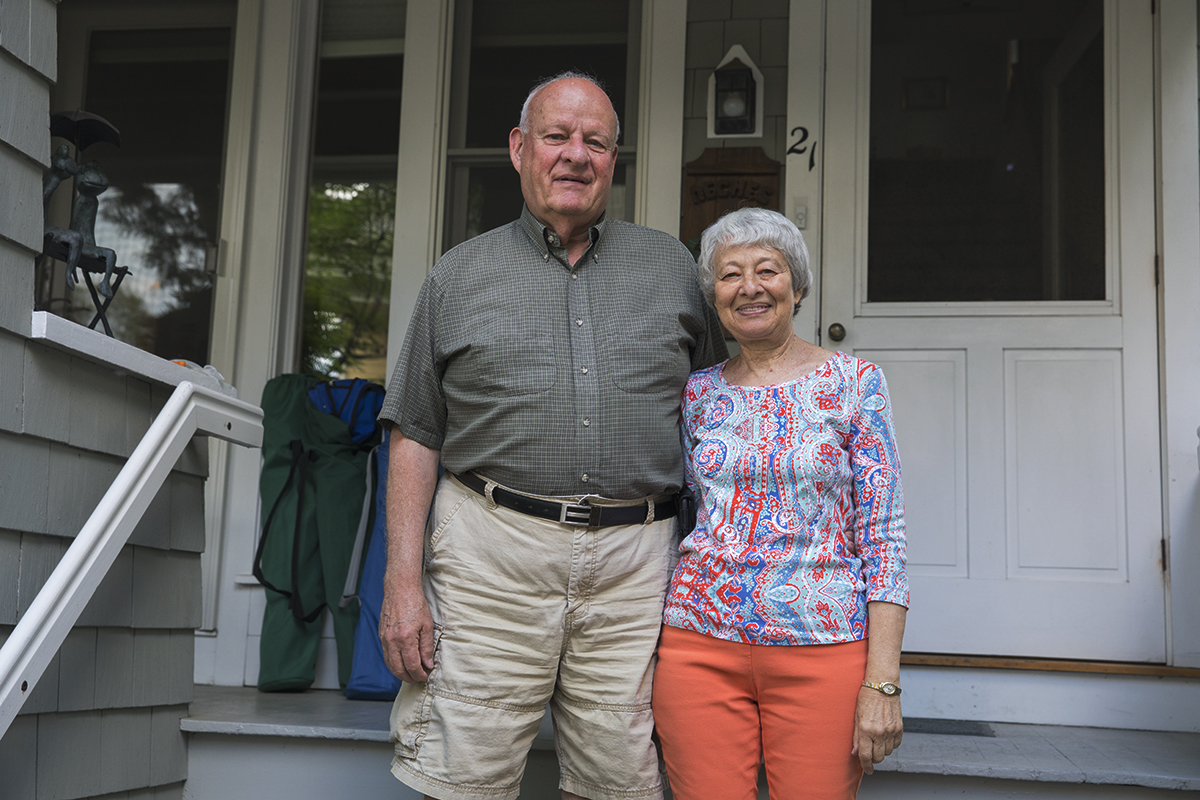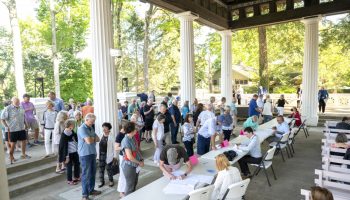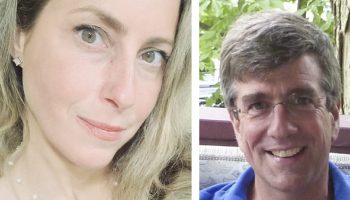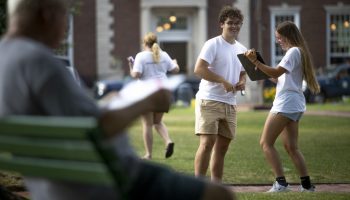At Saturday’s CPOA general meeting, questions were raised about a pair of issues with which the Chautauqua Property Owners Association has become associated in recent years. There were queries about streetlights and Wi-Fi connectivity on the grounds. A familiar figure was called upon to comment. Bill Neches rose to address both issues.
This made sense because over the past several years, 2016 Institution Class B trustee inductee Neches has become a voice associated with some of the issues on the minds of Chautauquans. A member of the CPOA board for nearly a decade, Neches has displayed an impressive commitment to pushing for solutions to issues whose complexity may vex and discourage others.
Neches and his wife, Ellen, discussed these and other matters and talked about their history at Chautauqua Institution in their capacious kitchen in Chautauqua’s central district. Ellen had no time to relax on her porch for this conversation; she was preparing food for a meal they would offer the following day to a group of students on the grounds.
Bill, can you take me through your time at CPOA?
Bill: We have been coming to Chautauqua since 1992. My work as a pediatric cardiologist in Pittsburgh was all-encompassing, but I would get a week up here in July and a week in August. Ellen was an early childhood teacher. We retired in 2005 to be closer to two of our grandchildren. A couple of years later, around 2008, I was asked to join the CPOA. Markie McCarthy was the one who approached me. I became the area rep for Area 7.
I want to mention a group of people then on the board who were interested in streetlights in Chautauqua. They included Donna Zellers, Hugh Butler and Bob Jeffrey, among some others. They had made a catalogue of the antiquated streetlights on the grounds, and I was intrigued. I still have their original documents. (Detailed maps of Institution streets with every streetlight marked were spread out on the dining room table as we spoke.) My sister is a lighting designer, so I had a bit of background on this. I joined them and took over as chair of the committee on the subject around 2009.
Over the years, the idea has become to replace the old energy-inefficient streetlights with new, LED, dark-sky lights, very energy efficient.
Ellen: They saw he was a live wire who knew something, and so they put him in as the chair. That’s what happened.
Bill: I want to mention also Terry McGowan, a Chautauquan and retired General Electric lighting designer. He and my sister and Naomi Miller, my sister’s mentor, have been our consultants. Naomi is a senior engineer for the lighting department in Portland, Oregon. She mentored my sister, Rita Koltai, when she got her master’s in lighting. So there were these three experts who helped us along the way.
Naomi suggested that we do a federal Gateway project, and that’s how we came to install the demonstration project streetlights on Pratt Avenue. That led to talks with the local electric company, National Grid. They didn’t want to talk to us in the beginning, and some local officials said they never would. But over time they did speak with us.
They initially quoted us a figure of around $30,000 for the 10 streetlights on Pratt. Remember, we had been paying rent on those lights for the previous 30 years or so. We are now, in 2017, close to signing a contract with National Grid that will call for us to purchase those same 10 streetlights on Pratt for $789. A lot of time and effort went into that price drop.
Even after I was chosen as CPOA board president in 2014, I stayed with this issue. My colleague John Dilley took over as lighting chair then. I do want to acknowledge the many contributions of those I have named and many others along the way, especially Chautauquan Rich Osborne on this project.
You are quick to share credit.
Ellen: Um, not necessarily all the time…
Bill: I tend to find people who, like me, are worker bees. Detail-oriented. As a cardiologist during my career, those are the kinds of cardiologists we hired in my division. We hired people like ourselves. I think this is a really good way to be an administrator. You find people who are willing to work and go to the nth degree to do the job that they take on or have been assigned. You end up with a really good team that way. That’s been an important philosophy throughout my career.
Where is the streetlight project today?
Bill: After all these years, we are getting close to an actual contract, and we needed an attorney. Bill Wright is now the attorney for the Chautauqua Utility District, which is in line to own the streetlights once we have completed the contract with National Grid. As you know, this project has proceeded at a glacial pace. National Grid has no real interest in selling off the lights; they have been and are a cash cow for them. They make their money leasing the lights more than selling electricity.
We are hoping to have the last piece of the contract with National Grid in place by the end of this summer. But even after we sign the contract with National Grid, numerous details will remain. CUD will need to get a bond, we will need arrangements with vendors. I could go on with technical details (and he did).
I have to ask you, when you started with lighting nearly a decade ago, how much of this technical information did you know?
Ellen: None! He heard a talk by Terry McGowan in Smith Wilkes Hall on dark-sky lighting and was intrigued.
Bill: We want to get Chautauqua designated as an international dark-sky site, which is an honor for eco-friendly communities.
Let’s say someone approached you on the street and asked when all the new Chautauqua streetlights would be fully operational. What would you say? How about by the start of the 2020 season?
Bill: I think that is very reasonable. The start of the 2020 season would be a good estimate of when we could have the new streetlights installed.
On to other subjects…
Ellen: Hey, don’t forget the television and the cable.
OK, how about the television and the cable? CPOA and CUD have been mentioned in connection with potentially wiring the grounds for Wi-Fi, even burying cabling underground. Where are we on that?
Bill: We are kind of at an impasse. It’s feasible to bury the wires during major street repairs. But it’s still expensive and neither Windstream nor Spectrum nor National Grid will pay for it. The Institution has put in mostly underground fiber optic cable to sustain its operations, but I think any wiring of the grounds would be above ground, on the current utility poles.
I’m not saying we will never be wired for Wi-Fi on the grounds. The new Hill administration, I think, is strongly committed to it. It’s needed for numerous reasons. Making life more inviting for the NOW Generation is only one of them. But I do not know how it will be done.
When you rose to the board of trustees, you appeared to carry a mandate for the property owners on the grounds. You have not forgotten where you came from. You still post on the Grapevine guidance for homeowners in dealing with the cable company.
Bill: All four of us (Class B trustees) carry that mandate. And all of the members of the board of trustees work hard for and care very deeply about the Chautauqua community and its welfare. They are all members of that community too, after all.
Are there community issues that need board of trustees attention?
Bill: I think it’s important to remember that most of the CPOA issues are operational in nature, so they are more appropriate for the Institution administration. Safety on the streets is certainly such an issue, and the installation of speed bumps around the grounds is one facet of that, for better or for worse!
I would say that there are issues that come from the community, among other sources, that are both board and Institution issues. One is the cost of Chautauqua. Others would include the lack of diversity, affordable housing and civil discourse.
Bill, you have shown an ability and willingness to wrestle with and master some abstruse concepts and details. Ellen, has he always been this way?
Ellen: Yes, I would say that he has. As he has said, he was immersed in his pediatric cardiology for his whole career. But I saw this curiosity of his first blossom around 1980 with computers. He had one of the first ones.
Tell me about your own career.
Ellen: I was an early childhood teacher, preschool and kindergarten. I taught for about 30 years in Pittsburgh where Bill’s practice was, and in New York City. We both grew up in Brooklyn.
How and where did you meet?
Ellen: We met at a hotel in Mount Freedom, New Jersey.
Really. What were the circumstances?
Ellen: This place is in central New Jersey, west of Morristown. It’s like the Catskills, only much closer to New York City. I was a counselor in the day camp there, and he was a busboy at the hotel.
Bill: Ellen’s parents and grandmother were on my station in the hotel dining room. I actually met my in-laws before I met Ellen.
Did he make a good first impression, Ellen?
Ellen: I had another boyfriend at the time, and they didn’t like him too much, and when I showed some interest in Bill, they were delighted that the old boyfriend wasn’t interesting to me any more.
You know, I was 16 at the time. They didn’t really think anything was going to come of it.
Bill: I fell in love with her before she fell in love with me.
Isn’t that how it’s supposed to happen?
Ellen: Absolutely!
Would he remember the date you met?
Bill: It was June 28, 1959.
Ellen: Wow, I couldn’t have told you that. But maybe he made that up. He’s very good at making things up, you know, sometimes.
Growing up in Brooklyn, his parents were schoolteachers. My mother was a teacher, my father was a civil servant, an accountant working for New York State. We are both the eldest sibling in our families, and we each have a sister and a brother. It gets complicated sometimes!
What about your kids?
Ellen: We have become an international family. Our daughter works in finance and accounting for Discovery television in the D.C. area. Our son-in-law is a grants administrator for the National Institutes of Health. They met in Costa Rica when our daughter worked there for Price Waterhouse. They have 15-year-old twins.
Our son in Sacramento married a Japanese woman he met while working in Japan as the representative for an engineering software company in Pittsburgh. Their daughter is a volunteer “shepherd” for CLSC this summer, escorting around the grounds some of the visiting authors. …
Earlier this season, our granddaughter was shepherding (the author Ed Yong). He looked at her and asked “So what is it like to be a person of color here?” That prompted an interesting dialogue!
Ellen, we know about Bill’s activity here in Chautauqua. How about you?
Ellen: Well, I’m on the board of the Ecumenical Community of Chautauqua. We are the largest (private) provider of housing on the grounds, and this is an issue about which I am passionate. I was asked to join because they were looking for a Jewish member.
How do you raise funds?
Ellen: We get some larger donations, but the bulk of our funding comes from small donations from guests who stay with us. These guests may be the least able to pay of all Chautauqua visitors, but they do give to help sustain our work.
Bill, can you leave us with one special thought about your pediatric cardiology practice?
Bill: I was in Pittsburgh for 33 years, same job. In the mid-1970s, I started a parent support group, to match up parents of children with newly diagnosed heart disease with parents with more experience. This became a support group called Heart to Heart. It is still going strong, and we had 750 people at our annual picnic last September. I’m proud of that.





